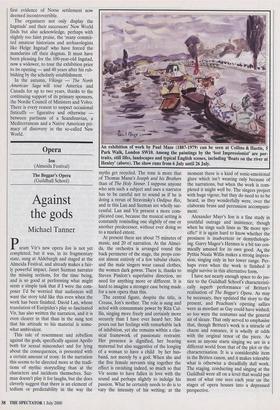Opera
Ion (Almeida Festival) The Beggar's Opera (Guildhall School)
Against the gods
Michael Tanner
Param Vir's new opera Ion is not yet completed, but it was, in its fragmentary state, sung at Aldeburgh and staged at the Almeida Festival, and already makes a fair- ly powerful impact. Janet Suzman narrates the missing sections, for the time being, and is so good at performing what might seem a simple task that if I were the com- poser I'd be worried that audiences will want the story told like this even when the work has been finished. David Lan, whose translation of Euripides's play so fascinated Vir, has also written the narration, and it is even clearer in that than in the sung text that his attitude to his material is some- what ambivalent.
This tale of resentment and rebellion against the gods, specifically against Apollo both for sexual misconduct and for lying about the consequences, is presented with a certain amount of irony. In the narration this seems to be directed more at the tradi- tions of mythic storytelling than at the characters and incidents themselves. Suz- man doesn't play it for laughs, but she does cleverly suggest that there is an element of tedium or predictability in the way the An exhibition of work by Paul Maze (1887-1979) can be seen at Collins & Hastie, 5 Park Walk, London SW10. Among the paintings by the 'lost Impressionist' are por- traits, still lifes, landscapes and typical English scenes, including 'Boats on the river at Henley' (above). The show runs from 6 July until 26 July.
myths get recycled. The tone is more that of Thomas Mann's Joseph and his Brothers than of The Holy Sinner. I suppose anyone who sets such a subject and uses a narrator has to be careful not to sound as if he is doing a rerun of Stravinsky's Oedipus Rex, and in this Lan and Suzman are wholly suc- cessful. Lan and Vir present a more com- plicated case, because the musical setting is constantly reminding one slightly of one or another predecessor, without ever doing so to a marked extent.
At present there are about 75 minutes of music, and 20 of narration. At the Almei- da, the orchestra is arranged round the back perimeter of the stage, the props con- sist almost entirely of a few tubular chairs, and the male singers wear casual clothes, the women dark gowns. There is, thanks to Steven Pimlott's superlative direction, no need for anything more or different. It is hard to imagine a stronger case being made for a new opera than this.
The central figure, despite the title, is Creusa, Ion's mother. The role is sung and acted with consummate power by Rita Cul- llis, singing more freely and certainly more securely than I have ever heard her. She pours out her feelings with remarkable lack of inhibition, yet she remains within a clas- sical framework of passionate restraint. Her presence is dignified, her bearing maternal but also suggestive of the longing of a woman to have a child by her hus- band, not merely by a god. When she and the five female servants sing together the effect is ravishing indeed, so much so that Vir seems to have fallen in love with the sound and perhaps slightly to indulge his passion. What he certainly needs to do is to vary the intensity of his writing; at the moment there is a kind of sonic-emotional glare which isn't wearing only because of the narrations, but when the work is com- pleted it might well be. The singers project with huge vigour, but they do need to to be heard, as they wonderfully were, over the elaborate brass and percussion accompani- ment.
Alexander Mayr's Ion is a fine study in youthful outrage and insistence, though when he sings such lines as 'Be more spe- cific!' it is again hard to know whether the prosiness is inadvertent or demythologis- ing. Garry Magee's Hermes is a bit too cos- mically amused for its own good. As the Pythia Nuala Willis makes a strong impres- sion, singing only in her lower range. Per- haps even when the work is finished it might survive in this alternative form.
I have not nearly enough space to do jus- tice to the Guildhall School's characteristi- cally superb performance of Britten's realisation of The Beggar's Opera. As may be necessary, they updated the story to the present, and Peachum's opening sallies were as mordant as Gay could have wished; so too were the costumes and the general air of sleaze. That only served to emphasise that, though Britten's work is a miracle of charm and romance, it is wholly at odds with the original tenor of the piece. As soon as anyone starts singing we are in a different world from that of the plot or the characterisation. It is a considerable item in the Britten canon, and it makes tolerable what is otherwise a dreadfully dull work. The staging, conducting and singing at the Guildhall were all on a level that would put most of what one sees each year on the stages of opera houses into a depressed perspective.


























































 Previous page
Previous page